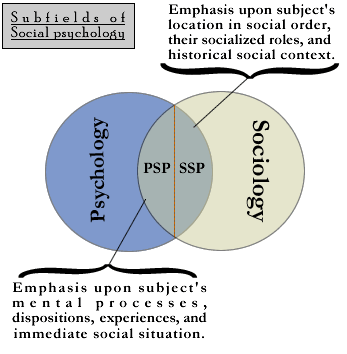Social psychology is the study of how individuals perceive, influence, and relate to others. It has also been described as the scientific study of social interactions. The social psychologist Gordon Allport defines the field as an attempt to understand and explain how the thoughts, feelings, and behaviors of individuals are influenced by the actual, imagined, or implied presence of others. By "imagined or implied presence," Allport suggests that the effects of social influence are felt even when there are no other people directly present; in other words, cultural norms affect us even when we are alone. We may be watching television, listening to the radio, or just recalling previous interactions. Social psychology includes the subfields of cognitive social psychology and social neuroscience.
Psychological versus Sociological Social Psychology
The field of social psychology has traditionally been described as a bridge between psychology and sociology. Social psychology focuses on the importance of individual or social influences on a person's perception of the world around them. There are some important differences in the way that psychological social psychologists and sociological social psychologists approach the field of study. Most notably, psychological social psychologists focus on individuals' mental processes, while sociological social psychologists focus on societal factors.

Social psychology
The field of social psychology consists of the overlapping foci of psychology and sociology. Thus, two academic emphases have emerged. Psychology-focused social psychologists (PSP) are individual-centered, and sociology-focused social psychologists are more concerned with the impact of external factors on an individual.
Social Perception
Social perception allows individuals to make judgments and form impressions about other people. These judgments are primarily based on observation, although pre-existing knowledge influences how observed information is interpreted. "Social perception" refers to the first stages in which people process information in order to determine another individual's or group's mind-set and intentions. These early stages help us interpret each other's actions so that additional information can be quickly inferred in order to predict behavior. Social perceptions can influence an individual's behaviors and attitudes.
General Research Interests
Social psychologists research the factors that lead people to behave in a given way in the presence of others, and look at the conditions under which certain behaviors and feelings occur. This field is specifically concerned with the way feelings, thoughts, beliefs, intentions, and goals are constructed, and how such psychological factors, in turn, influence interactions with others.
Social psychology attempts to understand the complex relationship between minds, groups, and behaviors in three general ways. First, it aims to describe how the thoughts, feelings, and behaviors of individuals are influenced by the actual, imagined, or implied presence of others. This includes areas like social perception, social interaction, and social influence (including trust, power, and persuasion). There is a strong interest in how perceptions and thoughts, as well as social cues, affect individual behavior in this area. Second, social psychology attempts to describe the influence that individual perceptions and behaviors have on the behavior of groups. This includes research on areas such as group productivity and decision making. Third, social psychology explains the dynamics of groups as behavioral entities. Research in this area investigates the relationships that one group has with another group, and/or the influence one group has on another group.
Some of the topics of focus within social psychology are listed below:
- attribution
- persuasion
- prejudice
- social perception
- conformity
- social influence
- group dynamics
- interpersonal attraction
Social psychology uses strictly controlled experiments, correlational methods, and observational methods to study these factors. The most common approach is experimental research. In order to try to limit unwanted social influences, deception is often used.
Structure-Agency Debate
One persistent theme in social psychology is the structure-agency debate. This is also referred to as the individual-holism debate. It involves questions about the nature of social behavior: for example, does social behavior ultimately stem from the individual, or is it largely a product of socialization, interaction, and greater social structures?
Structure is the recurrent patterns or arrangements that influence or limit the choices and opportunities available. Agency is individuals’ capacity to act independently and to make their own free choices. The structure-versus-agency debate may be understood as an issue of socialization against autonomy in determining whether an individual acts as a free agent or in a manner dictated by social structure. Some theorize that what we know as our social existence is largely determined by the overall structure of society. On the other hand, other theorists stress the capacity of individual agents to construct and reconstruct their environments.